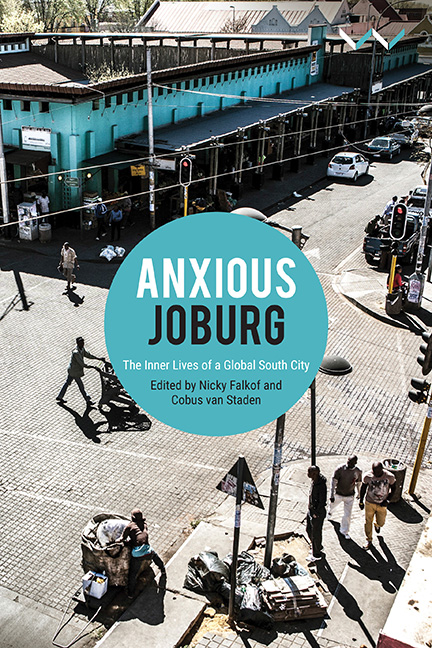Book contents
Introduction: Traversing the Anxious Metropolis
Published online by Cambridge University Press: 16 June 2021
Summary
Johannesburg became and remained, by default, an instant city, periodically growing and being torn down as the gold seams shifted course in one direction or another and the needs of its fickle residents changed … It is said that Johannesburg has been built up and torn down no fewer than five times since it first appeared on the Highveld in 1886. And each time it has re-emerged even uglier than before … No one has really been able to wrestle Johannesburg into any kind of civilized order. (Matshikiza 2004, 481–2)
Something odd is happening in Johannesburg. A city that for many years was used to illustrate disaster, decay and the failures of the post-apartheid promise is suddenly attractive. From being a place that wealthy tourists and destitute migrants alike warned their compatriots to avoid, Johannesburg has once again become desirable. No longer just a catalogue of potential dangers, the city has seen its longstanding aspirational qualities condensed into an atmosphere of edgy, global chic, epitomised by its place on the must-visit lists of fashionable media outlets like Travel & Leisure (Knafo 2017), which calls it ‘Africa's hippest city‘; GQ, which crowned it the ‘new cool capital of the southern hemisphere‘ (Carvell 2015); and Culture Trip, which names it ‘the one place you need to visit this year’ (Jordan 2018). Joburg, as lifestyle writers say, is having a moment.
Enthusiastic journalists emoting about its hipster-friendly downtown cannot, however, avoid traces of the city's darker reputation. Notwithstanding its renewed cultural capital, Joburg remains South Africa's ‘gritty urban metropolis’ (Jordan 2018), a place where intense glamour intersects with intense poverty, where the ambitious and the volatile live cheek by jowl. Most importantly, though, it remains a place where people live in multiple, often conflicting ways. Optimistic portrayals of a tourist-friendly metropolis cannot account for the city's capacity to surprise, to unsettle, to make precarious. And yet it is part of the inevitable contradiction of Johannesburg that its parks, museums and coffee shops exist in awkward equilibrium with, not surplus to, its inner-city slums and peripheral informal settlements, its crumbling mines, its failing highways, its car guards, its security companies; and that it is renowned for both its potent dangers and its easy sociality and unexpected warmth towards strangers, which can seem so incongruent in a high-risk place.
- Type
- Chapter
- Information
- Anxious JoburgThe Inner Lives of a Global South City, pp. 1 - 18Publisher: Wits University PressPrint publication year: 2020



